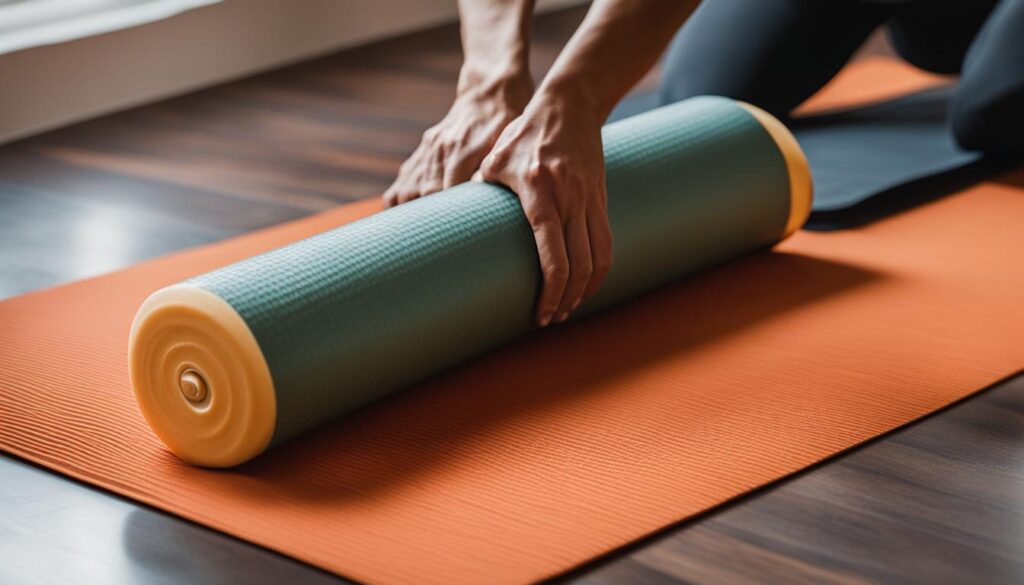When you’ve experienced a muscle cramp, you know that immediate relief is a top priority. These uncomfortable involuntary muscle contractions can disrupt your daily activities and severely impact your night’s rest. But what means can we utilize for muscle spasm relief? And are there natural remedies for muscle cramps that can effectively alleviate our discomfort? Let’s dive into these questions, exploring various muscle cramp treatments and relief strategies that can assist in managing this common condition.
Key Takeaways
- Effective muscle cramp relief often involves identifying triggers and addressing them through lifestyle modifications.
- Stretching and massaging the affected muscle during a cramp can provide immediate relief.
- Heat or cold applications can assist in relaxing the muscle and mitigating post-spasm pain.
- Natural remedies for muscle cramps, such as ensuring sufficient hydration, can prevent these discomforting contractions.
- For chronic or severe muscle cramps, a consultation with a healthcare provider is recommended to potentially explore prescribed medications as muscle cramp treatments.
- Vitamins and mineral supplements may play a role in preventing recurring muscle cramps.
- Being aware of the early signs of muscle cramps can help in taking active steps for prompt muscle spasm relief.
Understanding Muscle Cramps: Causes and Symptoms
Undergoing a muscle cramp can be a frustrating experience, marked by sudden, sharp pain and an uncontrolled tightening of the muscle. Muscle cramp causes can be varied, arising from different situations and conditions, yet common amongst them is the crucial role our daily routine plays in muscle health.
The primary catalyst for these involuntary muscle spasms often point towards dehydration, muscle overuse, or prolonged inactivity. Specific minerals such as sodium, calcium, and potassium are essential for healthy muscle function. A notable imbalance or insufficiency of these vital nutrients, often exacerbated by the continuous use of diuretics, can trigger muscle cramps. People involved in heavy manual jobs, athletes, older adults, pregnant women, and those suffering from nerve disorders are frequently subjected to muscle cramps.
Let’s break down some of these causes:
- Dehydration: A lack of adequate water intake can lead to an imbalance of minerals necessary for muscle contraction and relaxation, hence causing cramps.
- Prolonged Inactivity: Sitting or standing still for extended periods without significant muscle movement can provoke muscle cramps.
- Muscle Overuse or Strain: Intense physical activity or exercise without appropriate breaks may lead to muscle strain and eventually cramps.
- Mineral Deficiency: An inadequate intake of electrolytes, specifically potassium, calcium, and magnesium, can trigger muscle cramps.
To prevent such situations, one has to adopt a lifestyle conducive to muscle health – stay adequately hydrated, incorporate enough physical activity without overworking muscles, and follow a balanced diet rich in essential minerals. This integrated approach will play an incremental role in muscle cramp prevention.
Remember, muscle health is not just about strength, it’s also about flexibility, endurance, and most importantly, balance. – Anonymous
Know how you can prevent muscle cramps and ensure your muscle health in our next section!
Natural Remedies for Alleviating Muscle Cramps
Understanding the simple, yet effective, remedies for muscle cramps can significantly enhance daily comfort and fluidity of movement. Such natural remedies for muscle cramps offer prompt relief and are easily achievable at home, comprising methods like hydration, stretching, and heat therapy. Let’s explore these efficacious muscle cramp remedies in detail.

Hydration: Essential for Muscle Function
Maintaining proper hydration forms a firm foundation for overall muscle health and function. Water is crucial as it aids in muscle contraction and relaxation, reducing friction and the discomfort generally associated with muscle cramps. The consumption of a balanced amount of salts and electrolyte-rich fluids is particularly helpful during vigorous exercise or in high-temperature environments, where dehydration could quickly lead to muscle cramps.
Stretching Techniques to Relieve Tension
Stretching techniques work wonders in alleviating muscle cramps by easing tension in the cramped muscle. Simple methods, such as gentle stretching exercises and massaging the cramping muscle, can provide immediate relief. These stretching practices provide an efficient method to relax the muscles and ease the associated cramping sensations. However, it is essential to ensure that stretching is done safely without overextending the muscle, potentially leading to injury.
Heat Therapy: A Soothing Approach
Heat therapy is another efficacious remedy for muscle cramps, promoting relaxation and offering immediate muscle cramp relief. The application of heat to a tensed muscle, such as with a warm towel or a heating pad, can relax contracted muscles, thereby mitigating the pain. Additionally, soaking in a warm bath can do wonders in providing broader muscle relaxation. On the other hand, for post-cramp discomfort or residual stiffness, a cold compress or ice pack can serve as an effective countermeasure.
| Remedy Type | Description |
|---|---|
| Hydration | Essential for efficient muscle function, assists in smooth muscle contraction and relaxation, critical to prevent cramps during physical exertion or in hot environments. |
| Stretching Techniques | Effective in reducing muscle tension and relieving cramps, includes gentle stretching exercises and massage to relax cramped muscles. |
| Heat Therapy | Relaxes tensed muscles, reduces pain and discomfort, can be applied with a warm towel or heating pad, soaking in warm bath aids overall muscle relaxation. |
| Cold Therapy | Effective in alleviating post-cramp discomfort and residual muscle stiffness, cold compress or ice pack is recommended. |
Exercises to Relieve Muscle Cramps
One of the most effective methods for muscle spasm relief lies in implementing specific exercises. Through consistent practice, these exercises can alleviate discomfort during an episode of muscle cramping and serve as preventive strategy against future occurrences.

Calf Stretches for Immediate Relief
For immediate muscle spasm relief in your calf, consider stretching exercises. Stand at arm’s length from a wall, placing your hands on the wall for support. Extend one leg back, keeping the heel flat on the floor. Ensure your foot points directly forward, parallel to the other. By slowly bending the front knee and moving your hips forward, you should feel a strong stretch in your calf. Repeat this exercise for both legs.
Thigh Stretch: Preventing Quadriceps and Hamstring Cramps
Thigh stretches often provide great relief for quadriceps and hamstring cramps. Stand next to a sturdy chair for support, then pull the foot up towards your buttock. Remember to keep your back straight and your body relaxed during this exercise. Alternate between legs for maximum effect.
Foot and Toe Stretches to Target Cramps in the Feet
If your cramps are often localized in the feet, foot and toe stretches could be particularly effective. While sitting or standing, raise your heels off the ground, leaving your toes touching the floor. This will stretch the muscles underneath your feet. Another helpful exercise involves picking up small objects using your toes, which also helps to stretch your foot muscles effectively.
Regularly performing these exercises as part of your daily routine can help manage and prevent muscle cramps. Remember, consistency is key with any exercise regimen aimed at muscle spasm relief.
Muscle Cramp Relief: Effective Self-Care Measures
Undergoing a muscle cramp can be quite distressing. Fortunately, with the right muscle cramp treatment and self-care measures, this discomfort can be significantly mitigated.
Stretching and massaging the cramped muscle are typical self-care efforts that bring comfort to the distressed area. A tip for soothing a calf cramp entails stretching out your leg and pulling the toes back towards the face:
“By adopting this position and gently massaging the affected area, relief can be achieved in a matter of minutes.”
Applying varying temperatures can also aid in muscle cramp relief. This includes the use of heat to relax the muscle, followed by cold application post-heat treatment to help reduce any residual pain. This combination, supplemented by staying hydrated, supports overall muscle health and aids in the prevention of muscle cramps.
These self-care measures, paired with proper muscle warming before any strenuous physical activity, can altogether help circumvent the occurrence of muscle cramps. Below is a table detailing the key self-care measures for muscle cramp relief:
| Self-Care Measures | Description |
|---|---|
| Stretching and Massaging | Helps to loosen the cramped muscle and alleviate discomfort. |
| Applying Heat | Assists in relaxing the muscle and reducing tightness. |
| Cold Application Post-Heat Treatment | Reduces any residual pain following heat treatment. |
| Stay Hydrated | Aids in maintaining muscle health and cramp prevention |
| Proper Muscle Warming | Prepares muscles for physical activity, reducing likelihood of cramps. |
To summarize, safeguarding yourself against muscle cramps requires diligence in practicing various self-treatments. With proper treatment and preventive measures, the discomfort of muscle cramps can be effectively managed and prevented.
When to Seek Medical Advice for Recurrent Muscle Cramps
While most muscle cramps can often be effectively managed with self-care strategies, there are situations when more specialized medical help might be critical. Persistent or severe muscle cramps that hinder your routine activities or sleep, might be signaling more serious underlying conditions. Understanding when and how to seek medical advice for muscle cramps is an essential part of managing them efficiently.
Preparing for Your Medical Appointment
If you suffer from recurrent muscle cramps, keeping a record of your symptoms might be incredibly helpful. Make sure to note down any evident triggers, the frequency and duration of the cramps, and if any self-care remedies provide relief. Remember to also collate a comprehensive list of current medications and dietary supplements, along with any personal life stresses or recent life changes. Documenting relevant family medical history may also provide important markers for diagnosing the root cause of your muscle cramps.
Understanding Treatment Options from Health Care Providers
Health care providers can offer diverse approaches to treat muscle cramps based on their cause and severity. They are well-positioned to clarify any concerns you may have about muscle cramp causes and prevention. Having prepared a list of questions about potential tests and treatments can be beneficial. It’s equally important to inquire about lifestyle modifications that can help with muscle cramp prevention.
Potential Prescribed Medications for Persistent Cramps
If your cramps are persistent and interventions like hydration and stretching fail to bring relief, the health care provider might consider medications. Certain medications, such as muscle relaxants or even specialized sleep aids, can significantly reduce the occurrence of nocturnal cramps. It’s crucial to discuss potential side effects with your provider and to report any adverse effects promptly.





